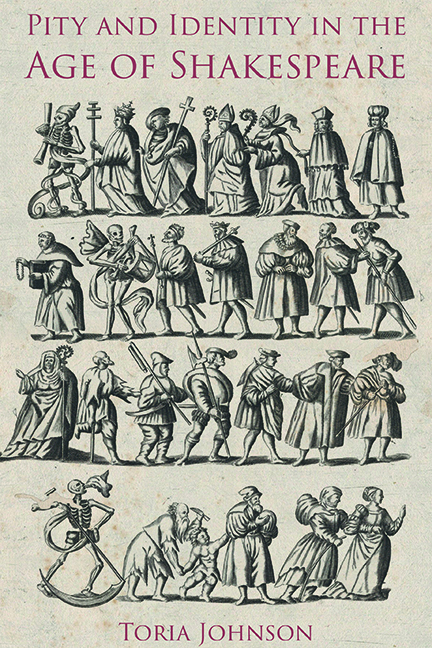Book contents
- Frontmatter
- Dedication
- Contents
- Acknowledgements
- Textual Note
- Introduction
- 1 ‘My name is Pity’: Mediated Emotion and King Lear
- 2 Violent Spectacle and Violent Feeling in Early Modern Lucrece Narratives
- 3 Dramatic Reworkings of Poetic Pity
- 4 Theorising Humanity Through Pity
- Conclusion
- Bibliography
- Index
- Miscellaneous Endmatter
1 - ‘My name is Pity’: Mediated Emotion and King Lear
Published online by Cambridge University Press: 07 October 2022
- Frontmatter
- Dedication
- Contents
- Acknowledgements
- Textual Note
- Introduction
- 1 ‘My name is Pity’: Mediated Emotion and King Lear
- 2 Violent Spectacle and Violent Feeling in Early Modern Lucrece Narratives
- 3 Dramatic Reworkings of Poetic Pity
- 4 Theorising Humanity Through Pity
- Conclusion
- Bibliography
- Index
- Miscellaneous Endmatter
Summary
It is the contention of this book that the drama of Shakespeare and his contemporaries testifies to a widespread cultural preoccupation with pity, and that this emotion specifically was felt to be something that challenged and defined the limits of early modern English identity. In what follows I will argue that early modern drama tracks the emergence and development of a very particular kind of pity (earthly, human, secular), and examines how that emotion (for better or worse) shapes the individual, and how it situates them in their community. The literary materials presented in this book confirm, above all else, an uneasy attitude towards pity; a sense that the emotion is unwieldy, not always fit for purpose, and yet still – somehow – understood as unavoidable and vital. This combination of resistance and dependence, I will suggest, is partly a condition of the early modern English emotional landscape, which itself was forever changed by the uncertainty ushered in by the English Reformations. The aim of this book is to show that cultural constructions of pity in early modern England felt newly relevant, and that Shakespeare and his contemporaries undertook much of this cultural ‘work’ on pity in their dramatic writing, as they attempted to reconcile the many conflicts and contradictions that emerged in the discourses surrounding pity. This chapter argues that Shakespeare's King Lear represents one such attempt, that queries pity's capacity to shape a stable emotional landscape, particularly in the absence of the structures of organised religion. This reading of Lear sees the play as saturated with a number of emotional and dramatic inheritances, a deeply nostalgic piece that draws on the structures and impulses of medieval morality drama to reflect the consequences of the emotional restructuring that happened in the wake of the English Reformations.
In using the plural ‘English Reformations’ I am (partly) adopting the manner suggested by Christopher Haigh for approaching these events. As Haigh points out:
The term “Reformation” is applied by historians to a set of historical events, often treated as if it was an inexorable process: a theological attack on Catholic doctrine, the abolition of papal authority, the reduction of priestly power, the suppression of monasteries and chantries, the abolition of the mass, the introduction of simplified Protestant worship, the enforcement of Protestant ideas, the conversion of people from Catholic to Protestant loyalties.
- Type
- Chapter
- Information
- Pity and Identity in the Age of Shakespeare , pp. 35 - 74Publisher: Boydell & BrewerPrint publication year: 2021



